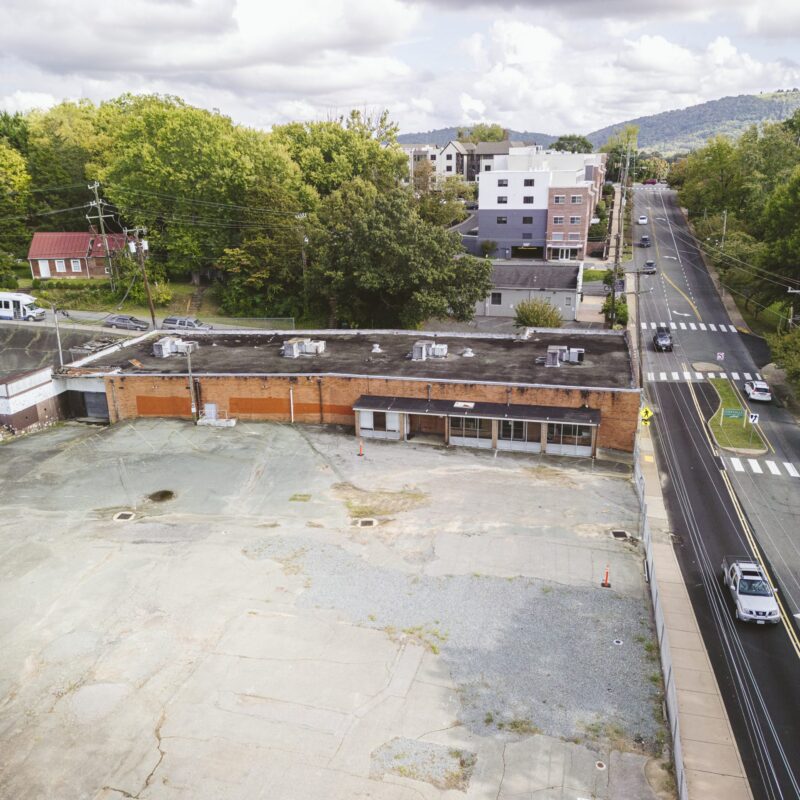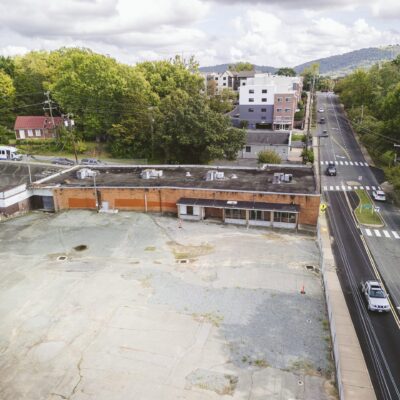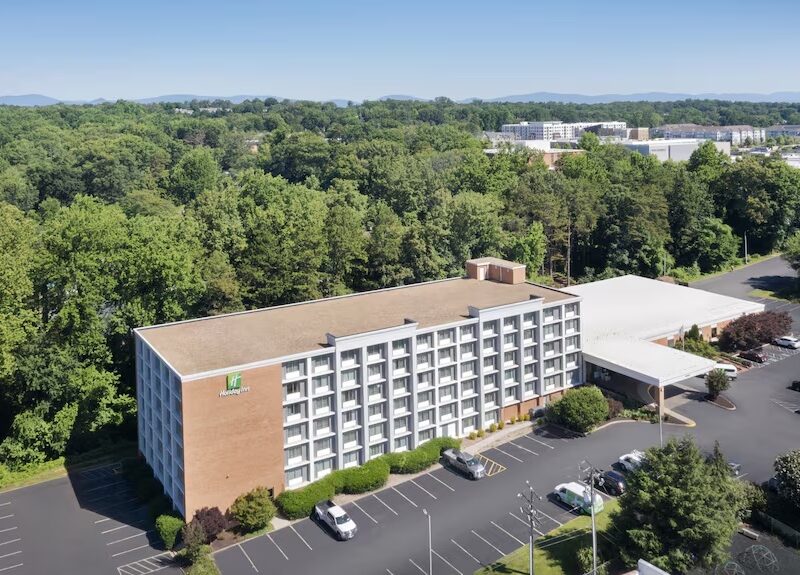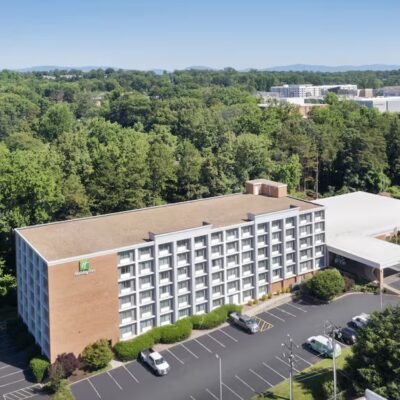I went to the offices at the John Paul Jones Arena yesterday to meet with the new general manager there, Jason Pedone. Pedone was promoted to the position when Larry Wilson—widely credited with putting Charlottesville on the map for bands like the Rolling Stones and U2—was promoted to run a larger group of facilities in Jacksonville.
Aside putting Charlottesville on the map for major touring acts, Wilson began managing the Paramount Theater after a couple of high-level shakeups resulted in a management deal with SMG, the facilities management company that also manages the arena.
Not only does the Tennessee native get new business cards and a new office, he has the opportunity to become one of Charlottesville’s major culture brokers. We touched on SMG’s relationship with the Paramount, his thoughts on the future of the arena and its controversial re-entry policy. Read more below.
Management is changing at the 15,000-capacity John Paul Jones Arena. Read the interview below for more.

What does your new job entail?
Larry hasn’t officially left yet. He’s still here for another week, but he’s transitioning himself. I can probably answer that a little bit better in a couple of weeks, but, by and large, it’s going to be a little bit more public image—being the person to answer the questions—and being the person to report to the university.
What makes this job easiest, and I know this sounds cliché, is that we have a bunch of really good people that are already here that are committed to making this the best arena in the state, region nation, whatever you want to say.
What would that mean to you, for the John Paul Jones Arena to be the best in the nation?
Selfishly, I already think we are the best arena in the nation, or at least in the state. Were the biggest, so it’s easy to make that leap. But in the grand scheme of things we’ve had a great track record in our first four years. Not much of that applies to me, since I got here in July of ’07.
I think each building has the responsibility to be the best it can be for its community, but the biggest thing is that, A, we want to make sure we’re bringing in the acts that people are interested in. Even though we don’t buy them, we’re not the ones who determine which acts are going to play here, necessarily, because we don’t go out and purchase acts. The promoters bring those in. But we want to encourage them to bring the best variety of quality entertainment that we can get our hands on, make this a desirable place to play, which is our responsibility, but also something the community plays a huge role in. Obviously, if they’re not willing to buy the tickets, they’re not going to come.
You don’t get Lady Gaga to come to Charlottesville unless they’re confident that this market, which is a medium market at best, is going to sell the tickets.
Can you say a little about the University’s relationship with arena?
The University sets very high standards on what they want their buildings to be, not just our facility, but I get that impression from the entire campus. They want to be top-notch, only bring in the best. That’s why they made the investment in this building that they did only. They could have just built a basketball arena, and there would have been nothing wrong with that. They chose to make it multipurpose and did it the right way, and built in enough seats. If we only had 10,000 seats, we might be having a different conversation. You could still get some shows, but you’re not going to get the Taylor Swifts. You’re not going to get the Lady Gagas, you’re not going to get some of the shows we’re announcing shortly.
Will you take an active role in the management of the Paramount Theater?
Larry was in charge of the Paramount, but that is not currently under my area of responsibility. I think, like Mary Beth [Aungier, general manager of the Paramount Theater] said, that will still be addressed by our corporate office.
It wouldn’t be my place to speak on that. I focus on the John Paul Jones Arena. Maybe that helps. This is my responsibility right now. Right now, Mary Beth’s taking care of the Paramount.
The Paramount Theater entered a three-year management deal with SMG, which also manages the arena, in October, 2008. More below.

What will Larry Wilson’s legacy be at the arena?
Personally, I can tell you that he spent a great deal of time building his staff, cares a great deal about this building, and personally, I think that translated to the community. People recognize that the community is better off because he was here. I think it’s just that him knowing the industry the way he did, and having some of the contacts he did within the industry, allowed him to help get some of these acts here. Especially in that first year, to just give us a chance. And everything else just took care of itself. The building was great, the audience was great, the acts, of course, were great. Put those things together, and everybody goes, “Hey, we’ve got a great place to stop here.” Of course, when you win building of the year, that speaks for itself.
Larry Wilson’s personal connections played a large part in courting acts like U2 and the Rolling Stones.
One of the best things Larry did, is that he’s not private with those types of things. So yes, he did know a lot of people in the industry, but for the last three years, they’ve all been at least speaking with me, if not dealing directly with me. He’s not trying to keep it close to the vest. Some people are like that. But he knew that the time would come when he would move on, and he trained his staff that way. The contacts are there. They exist, and at this point, they’re, by and large, with the building.
Are there any plans to reconsider the arena’s re-entry policy in the wake of the Morgan Harrington tragedy?
I would defer to the university’s release on that. I think there was another release that was put out last week after the press conference with the family. So, I’ll have to respect that. But that statement really covers where we are with things. That’s not hyperbole.
What is the future of SMG in Charlottesville?
Our corporate office supports us. We’re lucky to have a network of arenas that makes my job infinitely easier, where we’re able to say ‘hey, you want to tour Michael Jackson, we’ve got 57 buildings here that are ready to take your show.’ It’s a resource to us that we don’t have to scream into this mass of humanity that is the entertainment industry, and say, ‘Hey, look at us!” We’ve got corporate offices looking out for us, and that takes some of the edge off of us. Because we’re not New York City, obviously, we’re not Atlanta. We’re just trying to stay in the conversation.
What’s your favorite thing that you’ve seen at the arena?
Wow. I gotta tell you, not because it was the most recent show, but Taylor put on a heck of a show on Saturday. That was incredible…I had not seen her live, and it was incredible. I have so much higher long-term hopes for her career—and I knew she was going to be around for a long time anyway, but now I feel like she could do this for as long as she wants.
Anything else you’d like to add?
One of the things that makes my job easier here is that there’s just a cultural interest in music. People know who these artists are. You don’t have to explain to them who Justin Beiber is, or whoever else, they just know. They may not be willing to buy the ticket just yet, but they’ll go see them at the Jefferson when they’re just getting started, and catch them at the Pavilion as they grow a little bit. Then they’ll get them at the Nissan Pavilion when they’re a little bigger, and eventually they’ll play here. But you talk to these people, and it’s all DMB from day one. It’s nice to be a part of that.
Taking this job in a new community for a new person, no matter how great the community is, is a little more daunting. I understand what the community’s looking for. I know some of the history, and that will help, or should.
It looks like you need to have your business card updated.
They’re working on it.





